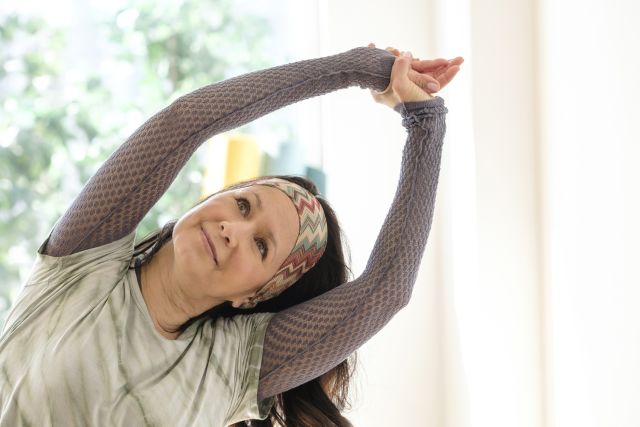Updated on August 1, 2024.
Breast cancer treatments such as chemotherapy and radiation are often lifesaving, but they may also come with severe downsides, like anemia, hair loss, and nausea. And in many cases, side effects like these don’t stop once treatment is over. Many survivors of breast cancer experience serious—and sometimes disabling—fatigue years after completing treatment.
But there is hope, both for people who have survived breast cancer and those who are undergoing treatment. One possible solution backed by research: yoga.
Yoga during treatment for breast cancer
A 2020 review of 82 analyses of other studies looked at health-related quality of life in people with breast cancer. Researchers found that, among these studies, the single most recommended exercise was yoga. The review was published in the journal Health and Quality of Life Outcomes.
Yoga was widely reported to be helpful for both social and psychological wellness, and helping to lower fatigue and sleep issues.
More recent research has continued to confirm the effectiveness of yoga, especially mindfulness yoga, which includes mindfulness meditation, yoga, breathing, and body awareness. A small 2022 study published in the journal Integrative Cancer Therapies found that yoga practices also helped with healthy weight maintenance during breast cancer treatment.
Practicing yoga may help overall well-being, and alleviate certain side effects of cancer treatments. A 2022 systematic review published in the Iranian Journal of Medical Sciences looked at nine studies of interventions to help relieve the side effects of breast cancer treatment.
The review found that yoga was an effective way to relieve nausea and vomiting caused by chemotherapy. Researcher suggested that healthcare providers (HCPs) include yoga—alongside cognitive-behavioral therapy, muscle relaxation training, and guided imagery—in a comprehensive array of interventions to offer to people with breast cancer.
Yoga for survivors of breast cancer
Yoga may also be a helpful tool during recovery from breast cancer.
A 2019 review of 37 analyses of other studies examined which treatments may be most helpful to breast cancer survivors. Overall, it found that yoga had some of the strongest evidence for improving quality of life, anxiety, sleep concerns, digestive issues, and fatigue.
More recent research continues to support that yoga can help, especially with improving range of motion, musculoskeletal issues, and overall quality of life. And a 2022 review published in the Journal of Cancer Survivorship noted that practicing yoga, along with engaging in aerobic exercise, may be one of the best ways for survivors of breast cancer to relieve fatigue.
Why yoga may help
Studies suggest yoga can help in multiple ways, both during and after treatment for breast cancer. But why does it help? It’s not fully understood, but some reasons could be:
- Fitness: For starters, yoga is a great way to regain strength and fitness lost during cancer treatment. According to the Centers for Disease Control and Prevention (CDC), staying physically active and maintaining a healthy weight while in cancer treatment or recovery can help raise your quality of life, as well as help your body respond better to treatments and lower your risk of the cancer returning.
- Relaxation: Yoga involves stretching, which can release tension in the muscles and body. Slower yoga such as meditative yoga (and not power yoga) has also been linked to lower levels of cortisol, a stress hormone. Some research also links yoga to maintenance of neurotransmitters and less inflammation, both of which can contribute to lowering stress.
- Pain relief: Practicing yoga can help with body awareness. Since less body awareness has been linked to more pain sensitivity, yoga practices may help to reduce pain. Yoga may also help the interactions between different areas of the nervous system, which might help reduce pain and inflammation and stop the feedback loop between pain and stress.
- Overall quality of life: Yoga is a complex practice, involving breathwork, postures, and meditation. It also encourages attentiveness to habits and routines around sleep and diet. So it may influence the person who practices yoga to make healthier choices on a daily basis.
Yoga instructors: choose wisely
It’s important to check with your HCP before starting any new exercise program. The nonprofit BreastCancer.Org notes that you can also ask them for a recommendation for a yoga teacher. Some are less experienced than others, and it’s safest to work with a teacher who is experienced working with people with cancer or survivors.
This is especially important for people with cancer or survivors who’ve had lymph nodes removed or whose cancer has metastasized to the bone. Both of these situations require special adaptations, so it’s best to only consult teachers experienced with special needs like these.
If your HCP isn’t sure who to recommend, ask local yoga teachers about their experience to determine which one may be best for you.







